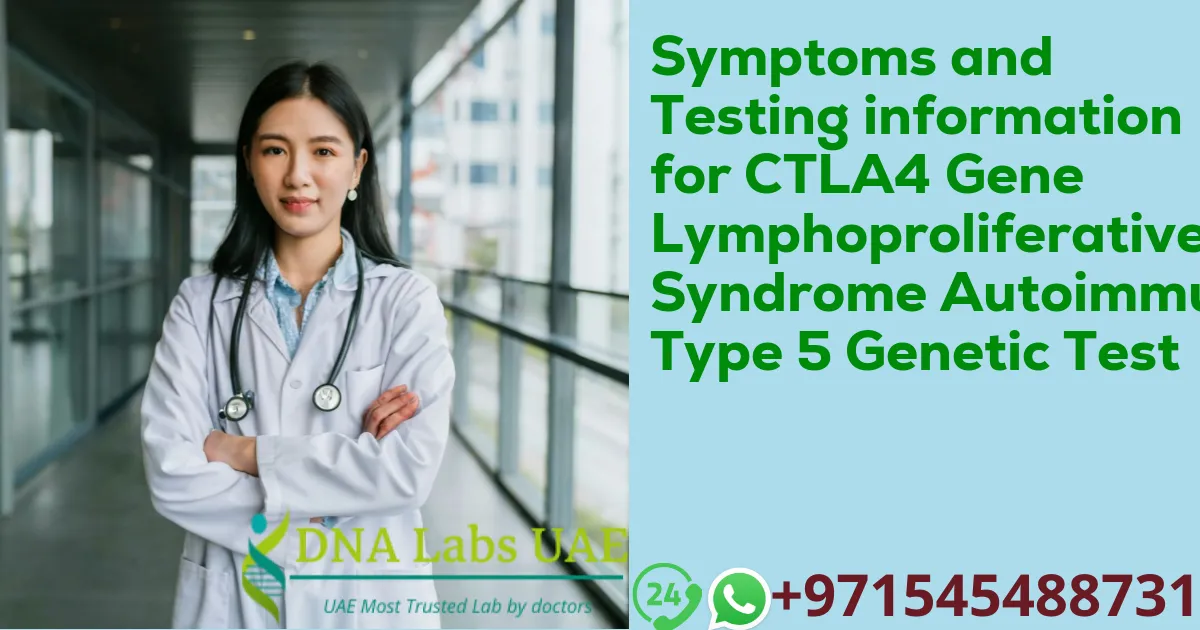Understanding the nuances of genetic disorders is crucial for early diagnosis and effective management. Among these disorders, CTLA4 Gene Lymphoproliferative Syndrome Autoimmune Type 5 stands out due to its complexity and the wide array of symptoms it presents. This condition is rooted in genetic anomalies that affect the immune system, leading to an increased risk of developing autoimmune diseases. At DNA Labs UAE, we offer a comprehensive genetic test for this syndrome, priced at 4400 AED, to aid in its identification and to facilitate timely intervention.
The CTLA4 gene plays a pivotal role in regulating the immune system’s response. Mutations in this gene can impair the body’s ability to control immune cell proliferation, leading to lymphoproliferative disorders. These disorders are characterized by an excessive production of lymphocytes, a type of white blood cell, which can result in various autoimmune symptoms. Recognizing the symptoms associated with CTLA4 Gene Lymphoproliferative Syndrome Autoimmune Type 5 is vital for seeking appropriate genetic testing and counseling.
Symptoms of CTLA4 Gene Lymphoproliferative Syndrome Autoimmune Type 5
The symptoms associated with this genetic disorder are diverse and can affect multiple body systems. They include:
- Autoimmune Cytopenias: This encompasses conditions like autoimmune hemolytic anemia, where the body’s immune system mistakenly attacks red blood cells, and immune thrombocytopenia, which targets platelets, leading to easy bruising and bleeding.
- Organ-specific Autoimmune Disorders: The syndrome can trigger autoimmune reactions against specific organs, such as the thyroid (Hashimoto’s thyroiditis or Graves’ disease), liver (autoimmune hepatitis), and intestines (inflammatory bowel disease).
- Respiratory Issues: Patients may experience respiratory complications, including interstitial lung disease, which causes scarring of lung tissue and impacts breathing.
- Recurrent Infections: An increased susceptibility to infections, especially those of the respiratory and gastrointestinal tracts, is common due to the compromised immune system.
- Splenomegaly: An enlargement of the spleen can occur, which may lead to further complications, such as hypersplenism, where the spleen excessively removes blood cells from the circulation.
It’s important to note that the severity and combination of these symptoms can vary significantly among individuals. Early detection through genetic testing is crucial for managing the condition effectively.
Genetic Test for CTLA4 Gene Lymphoproliferative Syndrome Autoimmune Type 5 at DNA Labs UAE
At DNA Labs UAE, we offer a specialized genetic test for CTLA4 Gene Lymphoproliferative Syndrome Autoimmune Type 5, priced at 4400 AED. This test is designed to detect mutations in the CTLA4 gene that are indicative of the syndrome. By identifying these mutations, our test provides crucial information that can guide treatment strategies and help manage symptoms more effectively.
Our test process is streamlined and patient-friendly. A simple blood sample is all that’s required to perform the analysis. Once the sample is collected, our state-of-the-art laboratory facilities ensure accurate and timely results. Our team of genetic counselors is also available to provide comprehensive support, helping patients and their families understand the implications of the test results and the next steps in managing the condition.
For more information on the CTLA4 Gene Lymphoproliferative Syndrome Autoimmune Type 5 genetic test and to schedule your appointment, please visit our website at DNA Labs UAE.
In conclusion, the CTLA4 Gene Lymphoproliferative Syndrome Autoimmune Type 5 presents a complex challenge due to its wide range of symptoms and the impact it has on individuals’ lives. Through early detection and intervention facilitated by genetic testing, those affected can achieve a better quality of life. DNA Labs UAE is committed to providing the highest standard of genetic testing services to help individuals and their families navigate the complexities of this genetic disorder.



